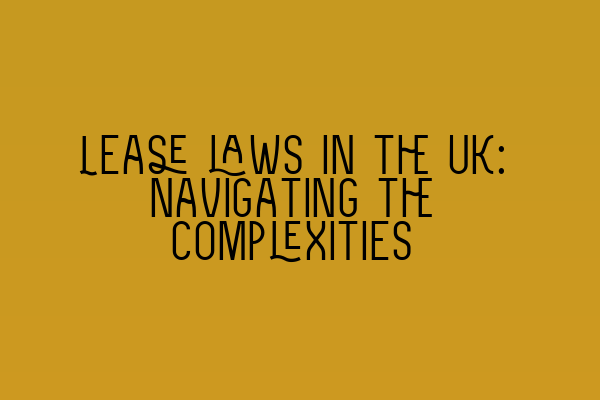Lease laws in the UK: Navigating the complexities
Introduction:
Lease laws form an essential part of property law in the UK, governing the legal relationship between landlords and tenants. Whether you are a property owner or a tenant, it is vital to have a good understanding of lease laws to navigate the complexities that may arise during the course of a lease agreement. In this blog post, we will provide you with an overview of lease laws in the UK and shed light on some key aspects that you need to be aware of. So, let’s delve into the details and explore this complex but crucial area of law.
1. Types of leases:
Lease agreements can vary in duration and nature. It is essential to differentiate between the different types to ensure you are aware of your rights and obligations. Some common types of leases include:
a. Residential leases: These are leases for residential properties such as houses or apartments and are primarily governed by the Housing Act 1988. This legislation outlines the responsibilities of both landlords and tenants, including the provision of a safe and habitable living environment.
b. Commercial leases: Commercial leases are used for non-residential properties such as offices, retail spaces, or industrial units. They are typically more complex and heavily negotiated to protect the interests of both landlords and tenants. The Landlord and Tenant Act 1954 provides tenants with certain rights, such as the right to renew a lease.
c. Ground leases: Ground leases involve the leasing of land only, where the tenant constructs buildings or makes improvements on the land. These leases generally have a longer duration and often include provisions for periodic ground rent payments.
2. Key lease terms and obligations:
Understanding the terms and obligations outlined in a lease agreement is crucial to ensure a smooth landlord-tenant relationship. Here are some key terms you should be aware of:
a. Rent: The lease agreement will specify the amount of rent payable, the intervals at which it should be paid, and any penalties for late payment.
b. Maintenance and repairs: The responsibilities for maintenance and repairs can vary depending on the type of lease. While landlords are typically responsible for maintaining the structure and exterior of a property in residential leases, commercial leases may require tenants to bear some of the repair costs.
c. Termination and break clauses: Lease agreements may include provisions for termination by either party before the lease term expires. Break clauses allow tenants or landlords to terminate a lease early, subject to specific conditions.
d. Alterations and improvements: Leases often outline restrictions on tenant alterations and improvements to the property. Tenants may need to seek the landlord’s consent or meet certain conditions before making changes.
3. Service charges and insurance:
In both residential and commercial leases, tenants may be required to contribute towards service charges for the upkeep of common areas, such as staircases, lifts, or communal gardens. Moreover, landlords often require tenants to have adequate insurance coverage, including public liability insurance, to protect against potential accidents or damages.
4. Lease renewals:
In the UK, commercial tenants enjoy certain rights under the Landlord and Tenant Act 1954 when it comes to lease renewals. This legislation provides tenants with the right to request a new lease at the end of the contractual term and outlines a specific procedure both parties must follow.
Conclusion:
Navigating the complexities of lease laws in the UK is essential for both landlords and tenants. A solid understanding of the different types of leases, key terms and obligations, service charges, insurance requirements, and lease renewals is crucial to ensure smooth and legally compliant lease agreements. As lease agreements are legally binding documents, seeking professional advice from a property law solicitor when drafting or reviewing a lease is highly recommended. Get in touch with SQE Property Law & Land Law to ensure you have the expertise you need to navigate the intricacies of lease laws with confidence.
Note: The information provided in this blog post is for general understanding only and should not be considered as legal advice. Laws and regulations regarding leases may vary, and it is important to seek professional advice specific to your situation.
